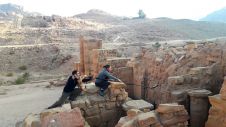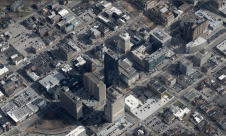Croatian Congress on Cadastre and Intergeo-East
Zagreb, Croatia, 7th to 9th March 2005
The third Croatian Congress on Cadastre with international participation was held at the Congress Centre of the Zagreb Fair in Zagreb, Croatia from 7th to 9th March 2005. The conference was held in conjunction with the second Intergeo-East. FIG deputy president Dr Andreas Drees addressed participants on behalf of the president, Prof. Dr Holger Magel.
The congress was held at a time when the Republic of Croatia is facing fulfilment of conditions for joining the European Union. One of the tasks involved concerns reform of cadastre and land registry. Croatia is approaching this issue with great care: laws regarding state survey, real-estate cadastre, land registry and property rights have already been passed. Within the programme of state survey and real estate cadastre for the period 2001-2005 the first phase has been completed; this concerned real-estate cadastre, establishment of basic geodetic networks and multipurpose spatial information systems. The establishment of a land database has begun the process of renewal of land registry.
It was the aim of the organisers of this conference, the Croatian Geodetic Society (CGS), to attract national, regional and European professionals in fields of cadastre, geoinformatics and land management to attend and provide their experience and proposals for acceleration of realisation of the renewal programme. This goal was well achieved. Eight hundred participants joined the event from Croatia, the neighbouring states, East and Western Europe. The congress was opened by CGS president Petar Micolic, who pointed to the main problem being a less than strong response on the part of politicians.
Two ministers from Croatia, the Minister of Justice and the Minister of Agriculture expressed their willingness to help building the necessary legal framework. Hopefully they will do so. It was obvious, listening to the following keynote speakers from Croatia, that there was an especial need for urban and rural land consolidation laws. It would not suffice to spend the more than two hundred million euros from the World Bank in surveying the whole country as effectively and quickly as possible whilst providing little or no help with appropriate land management services. In his own keynote, Dr Drees stressed the contribution surveyors could make beside their classical technical services; this was also a main topic during a visit to the Geodetic Faculty of Zagreb University.
A round-table discussion under the chairmanship of Prof. Dr Zeljko Bacic ranged over the differing experiences undergone by East European countries in developing cadastral and land registry systems. A final documentation of this discussion would help both as a contribution to individual states and to win the involvement of FIG Commissions.
CGS and the Scientific Board under Prof. Damir Medak organised an interesting congress that included eight technical sessions:
- Cadastre and E-Government
- Basis of Land Data
- Land and Ownership Registries - Problem Solving
- Complex Geoinformation Systems - a Tool for Registry Development
- Croatia on the Way to the EU - Contribution of Geoinformation
- New Technologies for State and Cadastral Surveys
- New Official Geodetic Datums and Cartographic Projections
- Cadastre and GIS - Practical Applications.
The proceedings are available through CGS. Intergeo-East would seem to be developing into an annual event for East Europe.
Andreas Drees, FIG vice president
President Magel visits Ordre des Géomètres-Experts Fonciers in Algeria
Alger, Algeria, 2th to 6th March 2005
Just one week after his Rome meeting with one of the oldest FIG member associations, the Italian CNG (Consiglio Nazionale Geometri), president Holger Magel visited one of the youngest FIG members, the Algerian OGEF (l’Ordre des Géomètres Experts Fonciers Algériens). President Magel was responding to the invitation of OGEF president Ahmed Benaissa to encourage Algerian colleagues to make further commitments and increased contributions to FIG and its commissions. The president underlined in his speeches and interviews with journalists the multiple advantages of FIG membership for an open market in Algeria. Due to current political goals Algeria, which has had and continues to have a very strongly military and state institutional character, including in the field of surveying, is showing a slight shift towards the private sector. As a result, the OGEF is now participating to some degree in cadastre work. During his visits to Agence Nationale du Cadastre, Institut National de Cartographie et de Télédétection and the Centre National de l’Information Géographique president Magel encouraged all responsible director-generals to ensure a fair balance between the public and private sector.

Value staying current with geomatics?
Stay on the map with our expertly curated newsletters.
We provide educational insights, industry updates, and inspiring stories to help you learn, grow, and reach your full potential in your field. Don't miss out - subscribe today and ensure you're always informed, educated, and inspired.
Choose your newsletter(s)
























